The following are some literacy resources and websites to support acceleration through alignment and spread. This is not seen as an exhaustive list but rather something to help get you started..
Ministry of Education resources and websites
Effective literacy practice
This resource is out of print, but many schools have copies on their shelves. It has many useful resources for planning teaching and learning in vocabulary, oral language, questioning and reading.
Working with English Language Learners: a handbook for teacher aides and bilingual tutors (2014)
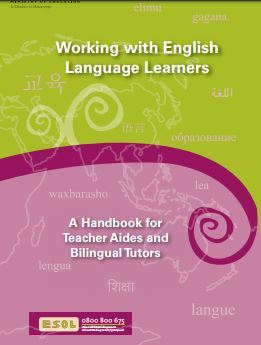
- link: https://bit.ly/1Kk1zxC
e-asTTle Online
 e-asTTle is an online assessment tool available on TKI. It has been developed to assess students’ achievement and progress in reading, mathematics, writing, and in pānui, pāngarau, and tuhituhi. The reading and mathematics assessments have been developed primarily for students in years 5–10.
e-asTTle is an online assessment tool available on TKI. It has been developed to assess students’ achievement and progress in reading, mathematics, writing, and in pānui, pāngarau, and tuhituhi. The reading and mathematics assessments have been developed primarily for students in years 5–10.
Te Kete Ipurangi (TKI)

The search bar located at the top of every TKI page provides a way to look for resources within a specific TKI community or to search across all the content available on the portal.
- link: https://www.tki.org.nz
Literacy Online
Literacy Online is a community on TKI. It has been developed to help primary and secondary teachers to develop teaching and learning programmes based on the literacy needs of their students. It incorporates sections relating to Teachers Needs, Students Needs and Impact.
Secondary Literacy Online
 Secondary Literacy is an area within Literacy Online on TKI. The area aims to help secondary teachers gain an understanding of the literacy demands within subject areas and required by the curriculum. The information available also supports teachers to develop teaching and learning programmes based on the literacy needs of their learners.
Secondary Literacy is an area within Literacy Online on TKI. The area aims to help secondary teachers gain an understanding of the literacy demands within subject areas and required by the curriculum. The information available also supports teachers to develop teaching and learning programmes based on the literacy needs of their learners.
“Each learning area has its own language or languages. As students discover how to use them, they find they are able to think
in different ways, access new areas of knowledge, and see their world from new perspectives" (p 18).
New Zealand Curriculum Guides
This collection is located on TKI. It provides subject specific guides for teachers to create quality teaching and learning programmes, with examples that incorporate literacy across the curriculum.
Literacy Learning Progressions
 The Literacy Learning Progressions: Meeting
the Reading and Writing Demands of the Curriculum (Ministry of Education, 2007) is an area on TKI that features a professional tool for teachers. The tool describes and illustrates the
literacy-related knowledge, skills, and attitudes that students need to draw on
in order to meet the reading and writing demands of the New Zealand Curriculum
from year 1 to year 10.
The Literacy Learning Progressions: Meeting
the Reading and Writing Demands of the Curriculum (Ministry of Education, 2007) is an area on TKI that features a professional tool for teachers. The tool describes and illustrates the
literacy-related knowledge, skills, and attitudes that students need to draw on
in order to meet the reading and writing demands of the New Zealand Curriculum
from year 1 to year 10.
School Journals and Junior Journals
Here is a selection of stories that could be used as stimuli within literacy programmes across the curriculum. This list is not exhaustive and we encourage you to visit the Literacy Online website on TKI.
School Journals
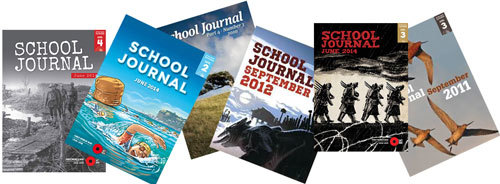
Level 2
- “Kurī” by Priscilla Wehi (SJ Level 2, October 2015)
- “Best Mates” by Paora Tibble (SJ Level 2, August 2015)
- “Jump!” by Chris Szekely (SJ Level 2, May 2015)
- “Poi” by Tira Johnson (Level 2 November 2014)
- “Pōhā: A Clever Way of Storing Food” by Michael Stevens (Level 2 September 2014)*
- “Iron Tamariki” by Paora Tibble (Level 2 June 2014)
- “Kaitiaki of the Stream” by Pātaka Moore and Monique Logan (Level 2 October 2013)*
- “Carving” by Apirana Taylor (Level 2 August 2013)
- “Ask Eddie” by André Ngāpō (Level 2 April 2013)
- “Kūtai Fritters” by Charlene Mataio (Level 2 August 2012)
- “Namu and Waeroa” by Ross Calman (Level 2 May 2012)
- “Kātarina Te Heikōkō Mataira: Walking on the lands of our Tīpuna” by Oho Kaa (Level 2 February 2012)
- “A Grin from Ear to Ear” by Tipene Watson (SJ Level 2, Oct 2011)
Level 3
- “The Remarkable Reti” by Kiwa Hammond and Duane Culshaw (Level 3 October 2015)
- “Spirit of the Bird” by Ben Brown (Level 3 August 2015)
- “Tohunga” by Potiki (Patariki Grace) (Level 3 November 2014)
- “Mahinga Kai Crusaders” by Stanley Walsh (Level 3 September 2014)
- “Te Hokowhitu-a-Tū: The Māori Pioneer Battalion” by Monty Soutar (Level 3 June 2014)
- “Serious Game” by Ross Calman (Level 3 October 2013)
- “Wero” by Andre Ngāpo (Level 3 August 2013)
- “Ngā Mahi a te Rēhia – Māori Games” by Ross Calman (Level 3 April 2013)
- “Iratumoana and Tarakura of the Rangatikei Plains” by Bernadine Ngaheu (Level 3. September 2012)
- “Heartbeat” by André Ngāpō (Level 3 June 2012)
- “Tarere Ana Au” by Hirini Melbourne (Level 3 June 2012)
- "In the Beginning” by Kātarina Te Heikōkō Mataira (Level 3 April 2012)
- “Hone Tuwhare” by Ross Calman (accompanying Rain by Hone Tuwhare) (Level 3. February 2012)
- School Journal Part 3, Number 3, 2010 (Rēkohu-themed journal)
Level 4
- “The Seeing Hawk” by Ben Brown (Level 4 October 2015)
- “Hakaraia: Warrior Peacemaker” by Mark Derby (Level 4 May 2015)
- “Ngā Pakanga o Aotearoa/The New Zealand Wars” by Ross Calman (Level 4 November 2014)
- “King and Country” by André Ngāpō (Level 4 June 2014)
- “On the Trail of a Taniwha” by Rob Tipa (Level 4 October 2013)
- “King Street Bridge” by Hinemoana Baker (Level 4 October 2013)
- “Te Manako” by André Ngāpō (Level 4 May 2013)
- “Too Much, Nanny P” by Viktor Allen (Level 4 October 2012)
- “Rata and the Totara Tree” by Kātarina Te Heikōkō Mataira (Level 4 March 2012)
- School Journal Part 4, Number 3, 2010 (Rēkohu-themed journal)
Junior Journals
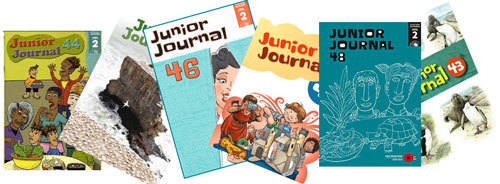
- Junior Journal 51 - “Kāhu and Hōkioi” by Ariana Tikao
- Junior Journal 50 - “Kākano” by Kelly Joseph
- Junior Journal 49 - “Tūī” by Kelly Joseph
- Junior Journal 48 - “Rongoā Māori” by André Ngāpō
- Junior Journal 47 - “Kahu Ora” by Marama Rangiaho-Katipa
- Junior Journal 46 - “Hinemoa and Tūtānekai”
- Junior Journal 45 - “Uira” by Hirini Melbourne
link: https://literacyonline.tki.org.nz/Literacy-Online/Teacher-needs/Instructional-Series/Junior-Journal
Project Mātauranga
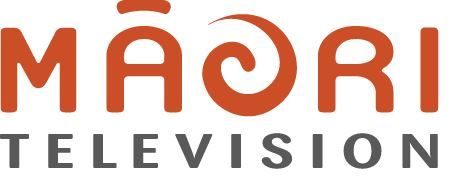
Project Mātauranga
Project Mātauranga is a science series presented by Dr Ocean Mercier, a lecturer at Victoria University that celebrates Māori innovation in the science sector. The series investigates Māori worldviews and methodologies within the scientific community and looks at their practical application. Step by step we’ll see the problems resolved, revealing in everyday language how Western Science and Māori knowledge systems are combining to provide solutions
Secondary Literacy: Guidelines for Effective Adolescent Literacy instruction (Wilson & McNaughton, 2009)
T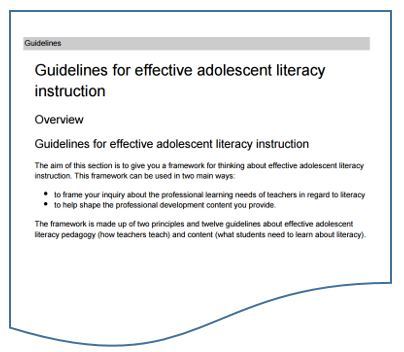
McNaughton and Wilson can be seen speaking about these understandings in a recording of a seminar produced by the Liggins Institute of the University of Auckland.





